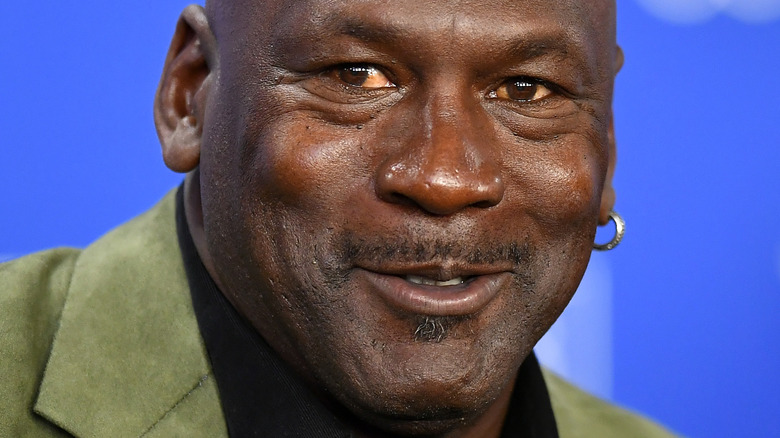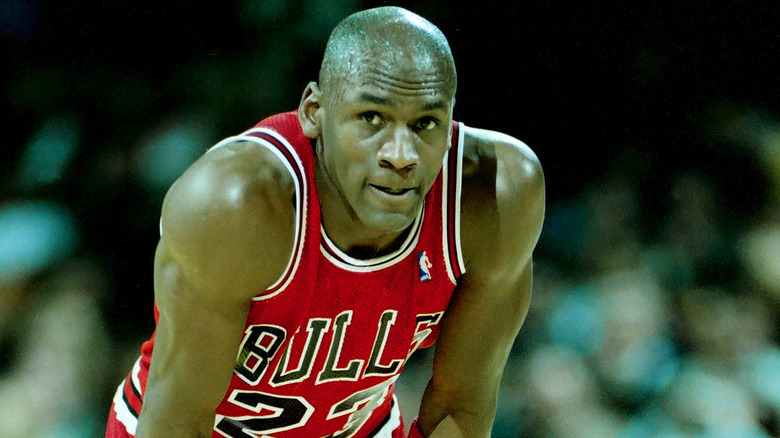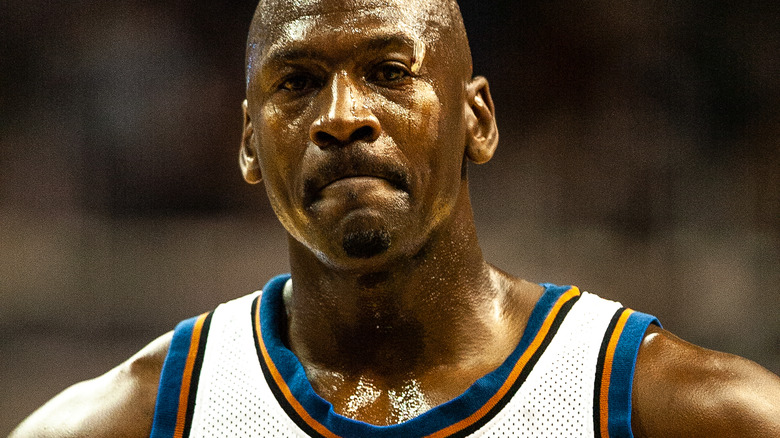Michael Jordan Retired 3 Times For Very Different Reasons
There are a few athletes that you can say are the greatest of all time in their sport. But undoubtedly, Michael Jordan is one of, if not the greatest, basketball players to ever live. He's had a long history in the game that all truly began when he was selected as the third overall pick in the NBA draft for the Chicago Bulls in 1984, per NBA.
His pazazz on the court and his likable attitude had people flocking to the stadium in an attempt to get a glimpse of his talent. Jordan's signature fadeaway shot had him achieving the impossible as he earned over 60 points in several games, a true rarity in the sport. Regardless of how tired or sick he was, Jordan always gave his all on the court. The NBA star solidified his G.O.A.T. status when he helped to pave the way for the Chicago Bulls to win not one but six NBA championships in his career. Not just that, but Jordan was named Finals MVP each time he won a championship.
Jordan's impact on the sport only continued after he retired. From having the highest NBA scoring average to being inducted into the Hall of Fame, the basketball star will long be remembered as a legend. While Jordan has had an incredible career, it also was almost cut short several times. During his career, Jordan retired a total of three times and had various reasons as to why.
Michael Jordan lost his desire to play
Nearly ten years after being selected from the NBA draft, Michael Jordan announced his first retirement in 1993. Basketball fans everywhere were shocked to hear that the 30-year-old was retiring at the peak of his career. According to Sports Illustrated, Jordan shared that he "lost the sense of motivation" to play the sport he loved. Many believed, however, there were underlying issues that influenced his decision. Fans think Jordan was shaken up by his father's recent murder as well as the investigation on his alleged illegal betting, per History. Regardless of Jordan's decision to retire, he never closed the door on his basketball career. He shared, "The word retire means you can do anything you want. So, if I desire to come back and play again, maybe that's what I want to do."
It turns out, Jordan did want to return to basketball, per Sports Illustrated. In 1995, the basketball star announced his return to the court by simply saying, "I'm back." However, by 1999, Jordan announced his second retirement. This time around, the basketball star shared that he was losing the desire to play and "wanted to spend more time with his family." Since Jordan had retired once before many asked if he would ever return to the game, the basketball star said there was a "99.9 percent" chance he wouldn't return. But that .1 percent left fans' hopes high.
Michael Jordan's final retirement
When Michael Jordan announced his second retirement, fans were devastated but hopeful that, like before, he would make a comeback to the sport. Luckily, Jordan did return to the sport in 2001, per NBA. No longer a player for the Chicago Bulls, Jordan would end his career as a player for the Washington Wizards.
At 40 years old, Jordan's final game was in 2003 against the Philadelphia 76ers. With an incredible career, it's unfortunate that the basketball star had to end his last game the way he did. Not only did the Wizards end up losing, but Jordan only scored 15 points, per USA Today. Despite his final game, it's undeniable that Jordan had an incredible career and has left an impact on players, coaches, and the sport itself. His final game was filled with applause and standing ovations as they bid farewell to the greatest player of all time.
Although many doubted this would be his last game, Jordan was getting older, and it was clear his passion was more focused on his family. After his last game, Jordan confirmed he would not return to the sport like he had many times before, per USA Today. He said, "Now I guess it hits me that I'm not going to be in a uniform anymore — and that's not a terrible feeling. It's something that I've come to grips with, and it's time. This is the final retirement."



